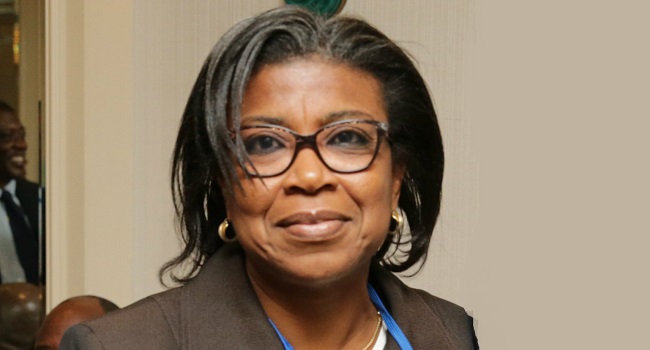Business
DMO defends Nigerian govt’s borrowings to fund fuel subsidy

Patience Oniha, director- general, Debt Management Office (DMO) has given reasons for the borrowings embarked upon by the federal government being used to fund subsidy payments on fuel.
This is as she disclosed that the Federal Government has borrowed N1 trillion to fund petroleum subsidy retention this year.
She made the disclosure In a presentation at the Executive Course on Budgeting and Fiscal Transparency at the Army Resource Centre in Abuja
According to Oniha, subsidy borrowing is one key factor that increased the country’s total debt stock to $42.8 billion.
Speaking on the topic, “Debt Sustainability Challenges and Strategic Revenue Mobilisation Initiative,” she argued that Nigeria’s debt was still within the acceptable limits and sustainable threshold.
She explained that despite criticisms of the government’s borrowing, Nigeria’s debt to GDP ratio remained among the lowest globally.
“Nigeria’s debt to GDP ratio was 23.06 per cent, countries such as Angola (136.54%), South Africa (69.45%), Ghana (78.92%), United States (133.92%) and United Kingdom (104.47%) have higher ratios,” she added.
On Public concerns on mounting debt, Oniha stressed that Nigeria was not alone in rising levels of public debts, pointing out that governments were borrowing more across the globe to meet economic and social challenges posed by the Covid-19 pandemic and the Russia-Ukraine war.
Read also: DMO DG, Oniha, urges Buhari to address petrol subsidy, insecurity over low revenue
Her words, “Governments across the world borrow. Globally, debt levels are growing, but it is not a new trend. Debt levels were already rising prior to the Covid-19 crisis when compared to 2014. Globally, sovereign debt grew from 49 per cent of GDP in 2014 to 57.9 percent in 2019 and in sub-Saharan Africa, from 35 percent of GDP in 2014 to 55 percent in 2019. In Nigeria, this ratio rose from 13 percent in 2014 to 19 percent in 2019.
“The Federal Government had to resort to borrowing to fund the budget due to revenue challenges,” she stated.
Oniha also said that the DMO was deploying World Bank Fund tools to ensure the sustainabilityof Nigeria’spublic debt.
According to her, “these tools include an annual Debt Sustainability Analysis (DSA) and a Medium-Term Debt Management Strategy (MTDS) every four years.
“Maturities in the public debt portfolio are well spread to avoid bunching of maturities and to ease repayments of maturing obligations. The Domestic Debt portfolio has securities with tenors ranging from 91 days to 30 years, while the External Debt Portfolio has securities ranging between 5 years to 30 years.”
The DG, in her presentation, further noted that the government was not just borrowing for borrowing’s sake, emphasising that the loans would enable the government to finance critical infrastructure with multiplier benefits (job creation, movement of persons and goods) and overall GDP growth.
Join the conversation
Support Ripples Nigeria, hold up solutions journalism
Balanced, fearless journalism driven by data comes at huge financial costs.
As a media platform, we hold leadership accountable and will not trade the right to press freedom and free speech for a piece of cake.
If you like what we do, and are ready to uphold solutions journalism, kindly donate to the Ripples Nigeria cause.
Your support would help to ensure that citizens and institutions continue to have free access to credible and reliable information for societal development.
























